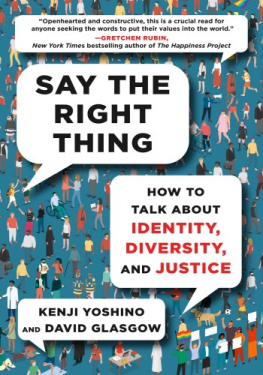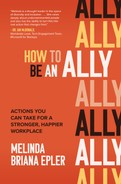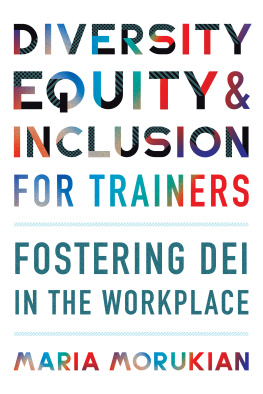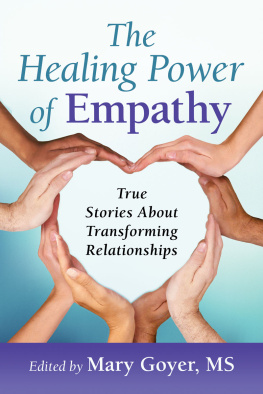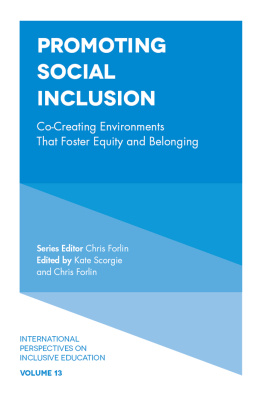Mary-Frances Winters - Inclusive Conversations: Fostering Equity, Empathy, and Belonging across Differences
Here you can read online Mary-Frances Winters - Inclusive Conversations: Fostering Equity, Empathy, and Belonging across Differences full text of the book (entire story) in english for free. Download pdf and epub, get meaning, cover and reviews about this ebook. year: 2020, publisher: Berrett-Koehler Publishers, genre: Politics. Description of the work, (preface) as well as reviews are available. Best literature library LitArk.com created for fans of good reading and offers a wide selection of genres:
Romance novel
Science fiction
Adventure
Detective
Science
History
Home and family
Prose
Art
Politics
Computer
Non-fiction
Religion
Business
Children
Humor
Choose a favorite category and find really read worthwhile books. Enjoy immersion in the world of imagination, feel the emotions of the characters or learn something new for yourself, make an fascinating discovery.

- Book:Inclusive Conversations: Fostering Equity, Empathy, and Belonging across Differences
- Author:
- Publisher:Berrett-Koehler Publishers
- Genre:
- Year:2020
- Rating:4 / 5
- Favourites:Add to favourites
- Your mark:
- 80
- 1
- 2
- 3
- 4
- 5
Inclusive Conversations: Fostering Equity, Empathy, and Belonging across Differences: summary, description and annotation
We offer to read an annotation, description, summary or preface (depends on what the author of the book "Inclusive Conversations: Fostering Equity, Empathy, and Belonging across Differences" wrote himself). If you haven't found the necessary information about the book — write in the comments, we will try to find it.
Mary-Frances Winters: author's other books
Who wrote Inclusive Conversations: Fostering Equity, Empathy, and Belonging across Differences? Find out the surname, the name of the author of the book and a list of all author's works by series.
Inclusive Conversations: Fostering Equity, Empathy, and Belonging across Differences — read online for free the complete book (whole text) full work
Below is the text of the book, divided by pages. System saving the place of the last page read, allows you to conveniently read the book "Inclusive Conversations: Fostering Equity, Empathy, and Belonging across Differences" online for free, without having to search again every time where you left off. Put a bookmark, and you can go to the page where you finished reading at any time.
Font size:
Interval:
Bookmark:
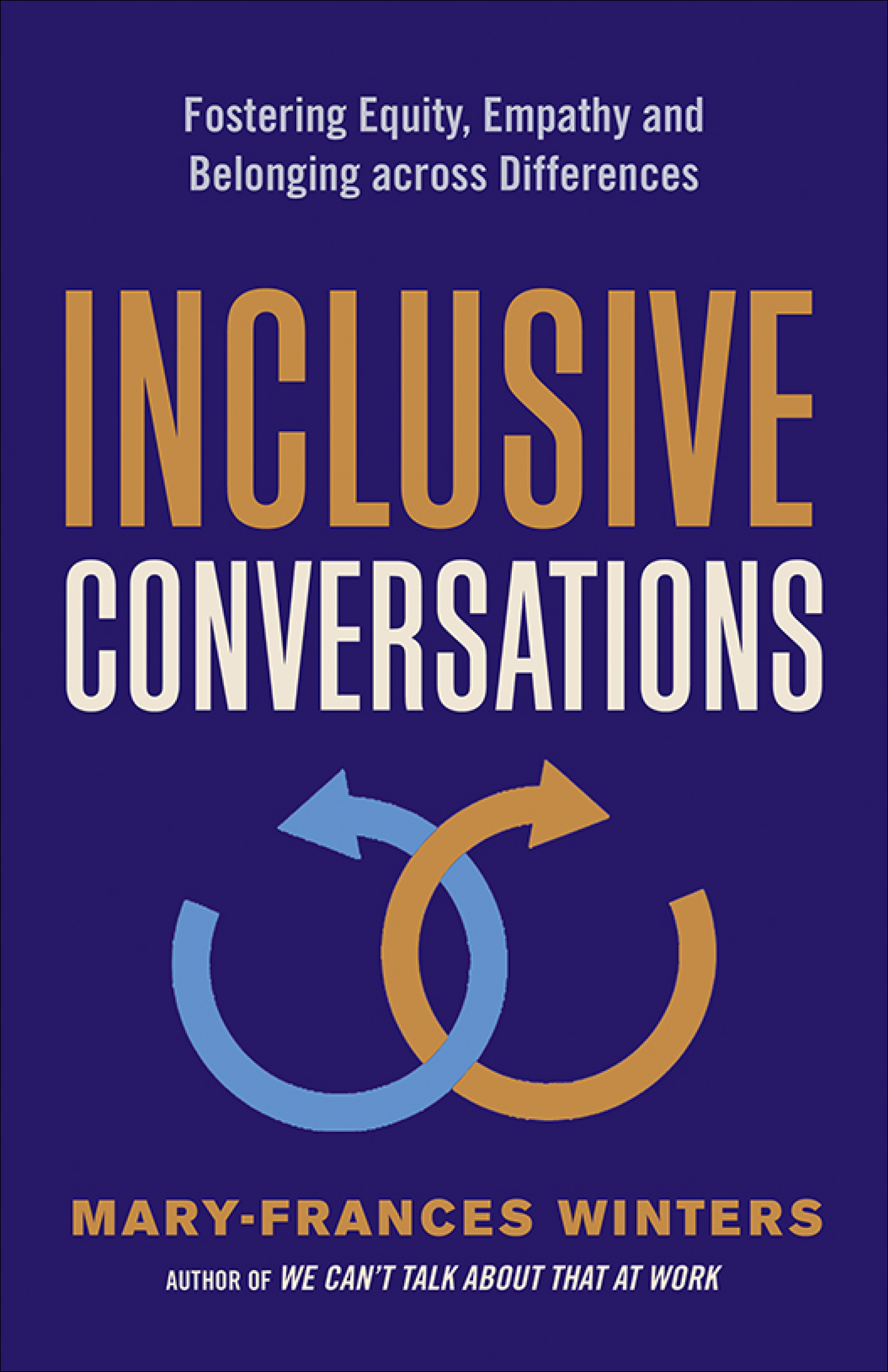
INCLUSIVE
CONVERSATIONS

Inclusive Conversations
Copyright 2020 by Mary-Frances Winters
All rights reserved. No part of this publication may be reproduced, distributed, or transmitted in any form or by any means, including photocopying, recording, or other electronic or mechanical methods, without the prior written permission of the publisher, except in the case of brief quotations embodied in critical reviews and certain other noncommercial uses permitted by copyright law. For permission requests, write to the publisher, addressed Attention: Permissions Coordinator, at the address below.
| Berrett-Koehler Publishers, Inc. |
Ordering information for print editions
Quantity sales. Special discounts are available on quantity purchases by corporations, associations, and others. For details, contact the Special Sales Department at the Berrett-Koehler address above.
Individual sales. Berrett-Koehler publications are available through most bookstores. They can also be ordered directly from Berrett-Koehler: Tel: (800) 929-2929; Fax: (802) 864-7626; www.bkconnection.com
Orders for college textbook/course adoption use. Please contact Berrett-Koehler: Tel: (800) 929-2929; Fax: (802) 864-7626.
Distributed to the U.S. trade and internationally by Penguin Random House Publisher Services.
Berrett-Koehler and the BK logo are registered trademarks of Berrett-Koehler Publishers, Inc.
First Edition
Paperback print edition ISBN 978-1-5230-8880-5
PDF e-book ISBN 978-1-5230-8881-2
IDPF e-book ISBN 978-1-5230-8882-9
Digital audio ISBN 978-1-5230-8883-6
2020-1
Book producer and text design and compostion: BookMatters; Cover designer: Rob Johnson, Toprotype Inc.; Copyeditor: Amy Smith Bell; Proofer: Janet Reed Blake; Indexer: Leonard Rosenbaum
To the generations of freedom fighters, civil rights leaders, and social justice advocates who preceded me in the ongoing quest for an inclusive, equitable world that values the dignity of all people.
And especially to those, past and present, who have lost their lives in the struggle.
The 2020 coronavirus pandemic has put a spotlight on the stark differences in socioeconomic standing that we as a global society face and how it disproportionately impacts different groups of around the world. Inclusive conversations are sorely needed if we, as humans, are going to figure out how to share the planet in ways that foster peace and mutual understanding rather than hate, polarization, and divisiveness. There is increasing evidence in all sectorsfrom politics to the workplacethat we are not doing a very good job with the former and the latter is becoming a way of life. More and more, our way of communicating about racial, ethnic, gender, religious, gender identity, socio-economic, and political differences is contentious and filled with derogatory personal attacks. When we disagree on matters big or small, we dig in deep defending our own positions, denigrating those who may have a different belief. This polarizing way of communication is all too prevalent in social media spaces, where personal attacks proliferate, and it is rare to see evidence of inclusive conversations. This became evident during the coronavirus outbreak, with people even taking up arms to protest decisions that states made about the length of time social distancing would stay in effect.
Our inability to engage in inclusive conversations can fuel violence in the workplace, in schools, on the streets, and in places of worship. The increasing global climate of acrimony seeps into our everyday lives in ways that we may not even realize. It can impact personal and workplace relationships, our sense of safety, and our ability to trust each other. Inclusive conversations are needed to build and restore our connectedness as humans, to kindle respect for the dignity of every individual, and ultimately to lead to better outcomes for historically marginalized groups.
From engaging in routine performance discussions in the workplace across dimensions of diversity to talking with children about differences, we often struggle to find the right words. In my work as a diversity, equity, inclusion (DEI) consultant, I regularly witness these struggles. It is not that most people do not want to engage in inclusive conversations; they do not know how. They do not know what to say so as not to offend or be accused of insensitivity or worse. In todays divisive climate we may be afraid to offer our perspective fearing that it might spark a verbal attack.
In 2017, I wrote We Cant Talk about That at Work: How to Talk about Race, Religion and Politics and Other Polarizing Topics to provide a road map for the prerequisites for engaging in conversations on what are often divisive subjects. Inclusive Conversations: Fostering Equity, Empathy, and Belonging across Differences goes deeper to lay out the conditions for effectively engaging in dialogue that fosters equity, empathy, and belonging, not only in the workplace but also in other settings. The book chronicles both the challenges and the solutions in creating and sustaining these conditions
I have learned from consulting with many organizations over the years that the ability to have difficult conversations effectively across difference is more about creating the right conditions than having a list of dos and donts about what to say (and not say). We have to go deeper in understanding why we should and should not say certain things across diversity dimensions. We need to have a more fundamental understanding of the historical inequities disproportionately suffered by some groups, many of which persist today. We have to create organizational cultures that are equitable, trusting, empathetic, accepting, forgiving, inclusive, and willing to acknowledge and address power dynamics. Inclusive conversations are not easy, but they are much more likely to be fruitful when these conditions are met. Most organizations strive to be all of these things. They have values and purpose statements, principles and guidelines that purport to create equitable and inclusive environments. The problem is too many of us have opposite experiences of inequitable, unaccepting, mistrusting environments, and inclusive conversations cannot happen under these conditions.
Inclusive Conversations provides practical guidance for engaging in inclusive conversations while elucidating the layers of complexities involved. The book is written for those who have historically found themselves in dominant, power positions as well as those who have historically been subordinated and marginalized because of their identity including race, ethnicity, gender, religion, sexual orientation, or other dimension of difference. Terms such as dominant, subordinated, marginalized, and others that may not be familiar to all readers are highlighted in the text and defined within the main text, as well as in a comprehensive glossary in the back of the book. If you lead a team or are a member of a team at work; if you are an educator, a religious leader, a politician, or a volunteer; if you are in any environment where different identities and cultures come together, this book can help you have more effective and inclusive conversationsa prerequisite for dismantling inequitable systems.
Font size:
Interval:
Bookmark:
Similar books «Inclusive Conversations: Fostering Equity, Empathy, and Belonging across Differences»
Look at similar books to Inclusive Conversations: Fostering Equity, Empathy, and Belonging across Differences. We have selected literature similar in name and meaning in the hope of providing readers with more options to find new, interesting, not yet read works.
Discussion, reviews of the book Inclusive Conversations: Fostering Equity, Empathy, and Belonging across Differences and just readers' own opinions. Leave your comments, write what you think about the work, its meaning or the main characters. Specify what exactly you liked and what you didn't like, and why you think so.


